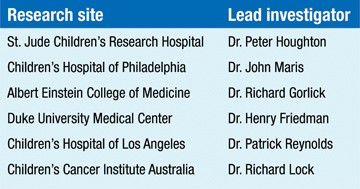Director's Update: November 2, 2004
One of the most challenging aspects of conducting clinical trials in pediatric populations is making decisions about which of the many new anticancer agents under development to test. Although treatment of childhood cancers is one of the most remarkable success stories in all of medicine - nearly 80 percent of children diagnosed with cancer survive 5 years or more - if we are to expand on that progress and ensure that every child who develops cancer has a legitimate chance of survival, we must address this issue.
That's why I am so enthusiastic about a new, first-of-its-kind program being launched by NCI: the Pediatric Preclinical Testing Program (PPTP). This program will systematically test 10-15 agents or combinations of agents annually in preclinical models of common childhood cancers. The program's goal is to generate the kind of information that will allow pediatric oncology researchers to make educated, reliable decisions on which new agents should be tested in children with specific cancers. This is critically important because only a limited number of clinical trials can be conducted for any given type of childhood cancer. If we are to provide more effective treatments for pediatric cancer patients, we must test the agents with the best chance of success.
The PPTP, which will begin testing its first set of agents in early 2005, is supported by an NCI research contract with St. Jude Children's Research Hospital (SJCRH), with Dr. Peter Houghton as the principal investigator. Testing will occur at SJCRH and other sites with expertise in specific childhood cancers (see box). Dr. Malcolm Smith, of the Cancer Therapy Evaluation Program, is the NCI project officer.

The PPTP will build on the impressive work to date by Dr. Houghton demonstrating the great potential of pediatric preclinical drug testing. For example, Dr. Houghton and colleagues found that topoisomerase I inhibitors such as topotecan and irinotecan were active against xenograft mouse models of neuroblastoma and rhabdomyosarcoma, especially when treatment schedules that allowed for prolonged agent exposure were used. Subsequent clinical trials modeled on these studies showed that both topotecan and irinotecan are active in children with rhabdomyosarcoma and neuroblastoma. More recent xenograft studies by Dr. Houghton showed that combinations of topoisomerase I inhibitors with standard agents like vincristine and temozolomide are particularly active, and clinical trials building on these observations are ongoing.
Through the PPTP, similar preclinical studies will be conducted using a broad spectrum of anticancer agents, with an initial focus on molecularly targeted agents that are being studied in adults with cancer. Importantly, the predictive capabilities of the PPTP's childhood cancer panels will be evaluated by comparing PPTP study results with the clinical activity of the tested agents in children, taking into account any differences between the pharmacokinetic profile of the agents in the animal models and in children.
Finally, NCI will sponsor a workshop next year to discuss opportunities for public-private partnerships to identify molecular targets specific to childhood cancers and build on the advances already made in developing targeted therapeutics.
All of us in the cancer community have heard uplifting stories of childhood cancer survivors and anguishing stories of those who did not share in this progress. Hopefully, this program will help ensure that no child will ever suffer or die from cancer.
Dr. Andrew C. von Eschenbach
Director, National Cancer Institute
|